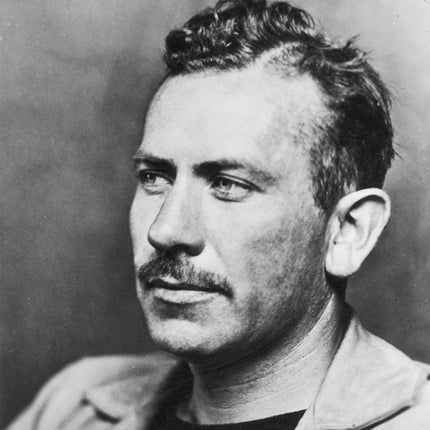Book Of A Lifetime: Of Mice And Men, By John Steinbeck

Your support helps us to tell the story
From reproductive rights to climate change to Big Tech, The Independent is on the ground when the story is developing. Whether it's investigating the financials of Elon Musk's pro-Trump PAC or producing our latest documentary, 'The A Word', which shines a light on the American women fighting for reproductive rights, we know how important it is to parse out the facts from the messaging.
At such a critical moment in US history, we need reporters on the ground. Your donation allows us to keep sending journalists to speak to both sides of the story.
The Independent is trusted by Americans across the entire political spectrum. And unlike many other quality news outlets, we choose not to lock Americans out of our reporting and analysis with paywalls. We believe quality journalism should be available to everyone, paid for by those who can afford it.
Your support makes all the difference.A shambling sixth-former returning a copy of Steinbeck's classic to the school library, I had to squeeze past two teachers. "What's the next stage Joyce?" said one. He was a grizzled old Welshman and he disapproved of the long hair growing way below my collar. "A spear and a bone through the nose?" The second teacher moved in and grabbed my book. He was new: younger, hipper, sympathetic. I was ready for more withering sarcasm but instead he said: "Steinbeck. The man. Cain and Abel, right?"
I'd enjoyed reading the book. I liked its mix of compassion, anguish and political edge, and I admired its accessible language. About Cain and Abel I hadn't got a clue. But because I was seventeen I stroked an imaginary beard and nodded sagely, as if the younger teacher and I shared a secret from which the grizzled old Housemaster was excluded. "Cain and Abel. Right."
I knew vaguely that Cain had killed Abel, but I had no biblical context for this scrap of knowledge. That chance remark by the young teacher sent me away to find out more.
I found out Cain was a crop farmer and Abel a shepherd. The murder had happened (depending on which version you read) because God had given the prettiest wife to Abel simply because he favoured Abel's work.
Thus sexual jealousy came into the equation, not to mention arbitrary injustice. I found that a mark had been put on Cain and that he would wander the earth and that the earth would never again reward him with a fair crop.
I re-read 'Of Mice and Men', and this time the pages blazed in my hands. Suddenly it was an illuminated manuscript. The migrant labourers wandering the spoiled earth of the American dustbowl were trying to get back to Eden. George and Lennie were descendants of Cain and Abel, brothers in all but blood. Curley's wife carried the burden of sexual guilt. George had to slay Lennie; all over again, it seemed.
I was astonished. I felt like I'd never read a book properly before in my life. The novel was a smuggler's suitcase with a false bottom. Or it was a vast echo. Or it was an echo of a shadow. I was bewildered, feverish with the discovery that great writing had hidden galleries. The young teacher had been passing on a secret after all.
What's more it was all done without showy language or pretentious lyricism. Just the roaring force of narrative, profound and clear, executed with precision and restraint.
I went back, trying to find more writing with occult dimension, and I found them in naturalistic and fantastical works alike. Hemingway wasn't just writing about fishing. Tolkien wasn't just writing about elves. The principle of narrative trumped lyricism every time. What's more, if a work didn't have a ghost or echo, it could never be a great work. After 'Of Mice and Men', the act of reading would never be the same again.
Graham Joyce's latest novel 'The Silent Land' is published by Gollancz
Join our commenting forum
Join thought-provoking conversations, follow other Independent readers and see their replies
Comments